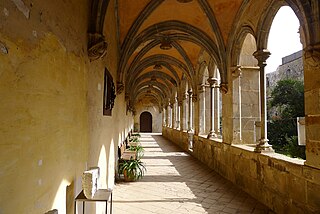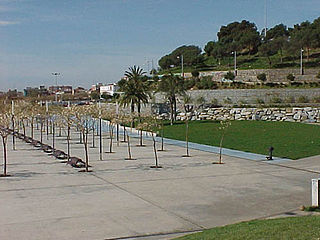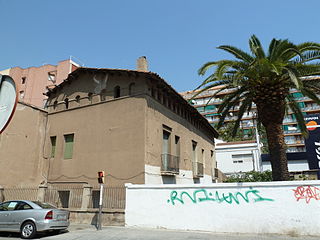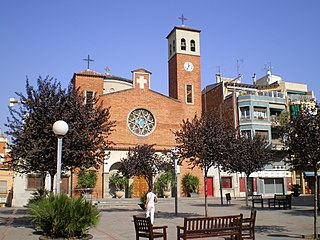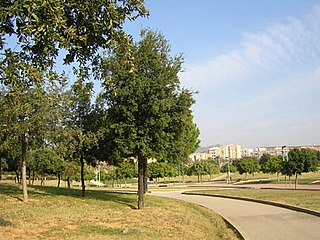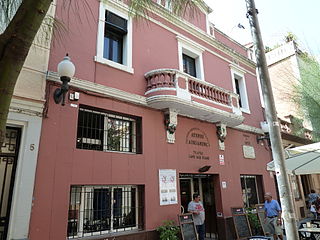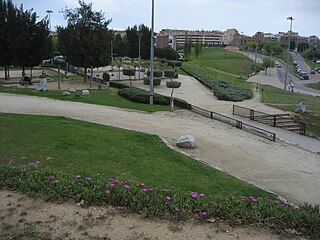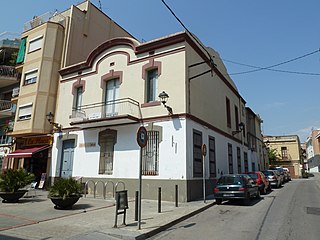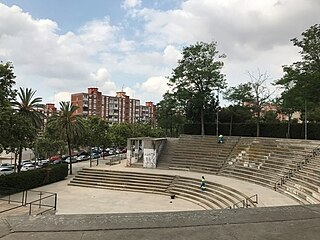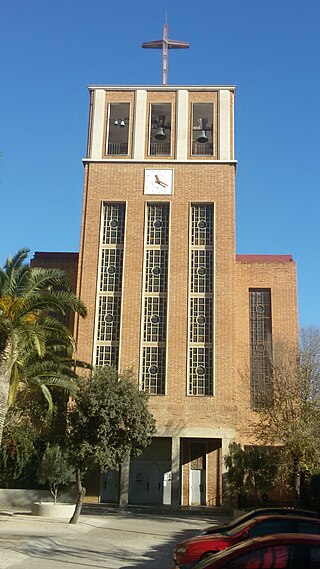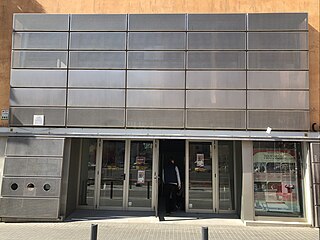24 Sights in Badalona, Spain (with Map and Images)
Legend
Welcome to your journey through the most beautiful sights in Badalona, Spain! Whether you want to discover the city's historical treasures or experience its modern highlights, you'll find everything your heart desires here. Be inspired by our selection and plan your unforgettable adventure in Badalona. Dive into the diversity of this fascinating city and discover everything it has to offer.
Sightseeing Tours in Badalona1. Monestir de Sant Jeroni de la Murtra
Sant Jeroni de la Murtra or Nostra Senyora de la Vall de Betlem is an ancient monastery of the Jerónimos order, located in the valley of Poià or Betlem, in the Marina mountain range, in the Canyet district of Badalona (Barcelonès). It was declared a historic-artistic monument of national interest in 1975, and later, in 2014, a Cultural Asset of National Interest, both the monastery and its grounds as well as the entire valley of Poià or Betlem, which also includes, for example, the hermitages of Sant Climent and Sant Onofre, the old hermitage of La Miranda or the aqueduct of Dosrius. In addition, the old monastery also occupies the first position within the so-called seven treasures of Badalona's cultural heritage, which were chosen in 2010 on the occasion of the city's capital of Catalan culture.
2. Baetulo
Baetulo is a city founded by the Romans on a hill by the sea around 100 BC, where the city of Badalona is currently located. The walled enclosure of the city occupied an area of approximately 11 hectares and was part of a project of foundations near the Mediterranean coast. It is worth noting the exceptionality of Baetulo, given that in Catalonia there are few examples of cities currently inhabited that have remains of this magnitude. The declaration of Baetulo as a Cultural Asset of National Interest (BCIN) in 1995 definitively confirmed this exceptionality.
3. Teatre Zorrilla
The Zorrilla Theatre is a theatre in Badalona founded in 1868. It was the second theater in the city, and throughout its history it has hosted different types of shows, as well as operating as a cinema between 1905 and 1970, from 1954 under the name of Aya cinema. Many prominent companies and actors have performed, such as Enric Borràs or Margarida Xirgu. Since 1986 it has been owned by the Badalona City Council and is one of the three municipal theatres in the city. On 21 January 1999 it was reopened as the Centre d'Arts Escèniques de Badalona. It has a stable programme, as well as being home to festivals such as FILMETS, the Li-Chang magic festival and Blues & Ritmes.
4. Torre Vella
The Torre Vella is a building in Badalona, a historical monument protected as a Cultural Asset of National Interest. It is located in the neighbourhood of Dalt de la Vila, the old town of present-day Badalona, next to the parish church of Santa Maria, and was for centuries the residence of the so-called lords of Badalona.
5. Parc del Turó d'en Caritg
The Turó d'en Caritg, the official name given by the Badalona City Council, although it has also been standardised by the ICGC as Turó d'en Carig, and formerly known as Turó d'en Claris, is a small elevation in the city of Badalona that has now been converted into an urban park. It is located in the neighborhood of Sistrells and stands out for being the second highest point of the Sierra de en Mena, at an altitude of 71m.
6. Can Rigalt
Can Rigalt, also called Can Barnola, is an old farmhouse located on the corner of Avinguda de Pi i Margall and Carrer Major de Sant Adrià de Besòs, listed as a cultural asset of local interest. It is currently owned by the municipality.
Wikipedia: Can Rigalt (Sant Adrià de Besòs) (CA), Ref Bcil Website, Heritage Website
7. Poblat ibèric del Turó d'en Boscà

The Iberian settlement of Turó d'en Boscà is a fourth-century BC settlement located on the top of Turó d'en Boscà, in Badalona (Barcelonès), which corresponds to the Iberian mint of Baitolo, which minted bronze coins between the second century BC and the beginning of the first century BC. The settlement is located on the summit and slopes of one of the hills of the coastal mountain range, between the valleys of Canyet and Pomar, to the west of Mas Boscà. The hill is signposted and protected by an iron fence.
8. Farmàcia Serentill
The Serentill Pharmacy is a commercial pharmacy establishment that, due to its historical and architectural-heritage character, is protected as a cultural asset of local interest in Badalona (Barcelonès). The business was founded at the end of the nineteenth century by Eduard Serentill i Tebé, and has continued to operate since then in the hands of the same family. The current appearance of the pharmacy, which dates from 1924, is the work of the Badalona architect Joan Amigó i Barriga, who gave it a noucentista appearance.
9. Anis del Mono

The sculpture of Anís del Mono, also known as the Anís del Mono monkey, is a bronze statue located on the seafront promenade of Badalona, at the foot and access platform of the Pont del Petroli, which pays homage to the historic Badalona brand of Anís del Mono, which is still being manufactured in the city today. It is the work of the Badalona artist Susana Ruiz Blanch, from the year 2011-12.
10. parc de les Muntanyetes
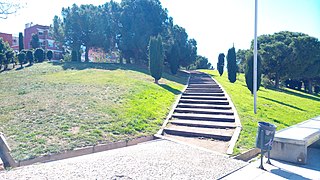
The Parc de les Muntanyetes is a park located in the Lloreda district of Badalona. With an area of 3.4 ha, it is bordered by the streets of Mendelssohn, Rossini, Apennines, Passeig d'Olof Palme and Carrer de Liszt. It was built in two phases, the second being completed in 2003.
11. Església de Sant Adrià
The church of Sant Adrià is a Catholic parish church in the municipality of Sant Adrià de Besòs (Barcelona). Its existence is documented in the eleventh century. The current temple was built in 1940, after the destruction of the old one in 1936 during the civil war.
Wikipedia: Església parroquial de Sant Adrià de Besòs (CA), Ref Bcil Website, Heritage Website
12. Parc de Nelson Mandela
The Nelson Mandela Park is a park located in the Montigalà neighborhood of Badalona, although it is also next to Bufalà. It has a remarkable surface area of 1.3 ha, bounded by Migjorn, Xaloc and Nelson Mandela streets; with access around its entire perimeter. It was inaugurated in 2007.
13. parc del G4
The G4 Park is a park located in the Montigalà district of Badalona, inaugurated in 1994. It has considerable dimensions with an area of 6 ha. It is bounded by Carrer de la Ciència, Travessera de Montigalà, Camí de Sant Jeroni de la Murtra and Avinguda de la Comunitat Europea. It is accessed via Carrer de la Ciència and Avinguda de la Comunitat Europea. It is an esplanade of forest meadow, with pines, cork oaks and Mediterranean shrub. The park is carpeted with mowed grass, and the paths are paved.
14. Parc de Montigalà
The Montigalà Park is a park located in the Montigalà district of Badalona. With an area of 8.1 ha, it is bounded by Avinguda de Puigfred, Carrer de Sant Fermí, Travessera de Montigalà and Rambla de Sant Joan. It is one of the most visited parks by the citizens of Badalona, since its inauguration in 1991.
15. Ateneu Adrianenc
The Ateneu Adrianenc is an athenaeum and multipurpose hall in Sant Adrià de Besòs, located at 7 Andreu Vidal Street. Private, it was founded in 1925 with the aim of promoting culture among the people of Adrian. It is currently the place where many of the city's associations have their headquarters and numerous cultural activities are carried out there. The building, in the Noucentista style and built around the middle of the twentieth century, is listed as an architectural heritage.
Wikipedia: Ateneu Adrianenc (CA), Ref Bcil Website, Website, Heritage Website
16. Parc de Nova Lloreda
The Parc de Nova Lloreda is a park located in the Nova Lloreda neighborhood of Badalona. It was inaugurated in 1982, so it has a certain history, as it was one of the first green areas created from the establishment of democracy after a neighborhood claim in the neighborhood, with the need to sponge it up. It is bounded by the Rambla de Sant Joan, the Camí de Sistrells and the Avinguda de Catalunya, with a total area of 1.5 ha.
17. parc del G5
The G5 Park is a park located in the Montigalà neighborhood of Badalona. It was inaugurated in 2003. It occupies an area of 4.2 hectares, is bounded by Carrer d'Anna Tugas, the Camí de Sant Jeroni de la Murtra and the Travessera de Montigalà, with access around its perimeter; it is a continuation of the Montigalà park.
18. Museu de Badalona
The Badalona Museum, opened in 1966, hosts the remains of the Roman city of Baetulo. The remains include Roman baths, shops, housing complexes, and part of the cardo maximus and decumanus maximus. Its museum holds a collection of artifacts from its own excavations and objects from other eras relevant to the city.
19. Casal de la Dona
The Casal de la Dona is a mid-nineteenth-century building in Sant Adrià de Besòs (Barcelona). Throughout its history it has had various uses: housing, school, court, among others. Currently, since 1984, it has been used today as a women's centre of the Sant Adrià women's association.
Wikipedia: Casal de la Dona (Sant Adrià de Besòs) (CA), Ref Bcil Website, Heritage Website
20. parc del Gran Sol
El Parc del Gran Sol és un parc situat al barri de Sant Joan de Llefià de Badalona. Té 1,80 ha i està delimitat per l'avinguda Doctor Bassols, el carrer Àsia, Juan Valera i l'avinguda Àfrica, amb accessos en tots els carrers perimetrals. Fou inaugurat el 1985 i es tracta d'un parc urbà d'ús veïnal ubicat dintre d'un sector d'habitatges d'alta densitat.
21. Parc de Can Barriga
The Can Barriga Park is a park located in the Bufalà district of Badalona, inaugurated in 1993. It is small in size with only 0.52 ha, divided into two levels. It is bounded by Avinguda de Martí Pujol and Carrer Tànger and Carrer Xaloc, with access by the first two, adapted for the disabled.
22. Mare de Déu de la Salut
The Church of Our Lady of Health is a Catholic parish church in the La Salut district of Badalona, on Paseo de La Salut, no. 38. It belongs to the archpriesthood of Badalona sud, in the archbishopric of Barcelona.
Wikipedia: Església de la Mare de Déu de la Salut (Badalona) (CA)
23. Blas Infante
The Blas Infante Theater is a cultural center and theater in Badalona (Barcelona). It is located on Andrés Segovia street, in the Sant Mori neighborhood of Llefià, being the only one of the public theaters in Badalona that is not located in the Center neighborhood.
24. Jardi de Quint Licini
The Garden of Quint Licini is an archaeological site from the Roman period in Badalona, currently a museum and part of the complex of spaces of the Museum of Badalona, and which is located in the basement of the Plaça de l'Assemblea de Catalunya, 3. It is an ancient garden of a Roman domus in the city of Baetulo, in the center of which there was a swimming pool, today only partially preserved.
Share
How likely are you to recommend us?
Disclaimer Please be aware of your surroundings and do not enter private property. We are not liable for any damages that occur during the tours.
